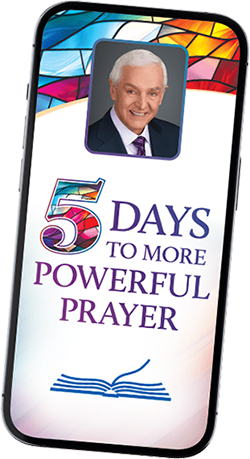Most Christians would agree that prayer is an essential spiritual discipline. We know that Scripture tells us to “pray without ceasing” (1 Thessalonians 5:17), and it promises, “The Lord is near to all who call upon Him” (Psalm 145:18). Yet only 55% of Christians “say they rely a lot on prayer and personal religious reflection when making major life decisions.”1 Even the disciples struggled with prayer. As O. S. Hawkins noted in The Prayer Code, “The only thing the disciples ever asked Jesus to teach them to do was to pray.”2
The thought of reaching beyond the confines of this world to knock on the door of heaven seems presumptuous, if not impossible. Yet Scripture urges us to do just that—to speak our hopes and fears to Almighty God, believing He will hear us and trusting He will answer. Could it be that simple? Yes, and it is. Let’s demystify the art of prayer by answering four fundamental questions.
How Should We Pray?
Is There a Wrong Way to Pray?
Why Should We Pray if God Already Knows What We Need?
Why Is Prayer so Hard for Us?
How Should We Pray?
The simplest definition of prayer is talking to God. It does not require eloquent speeches or elevated spiritual status. Anyone with a sincere heart can do it. In Luke 18, Jesus shared a parable about a Pharisee (a religious leader) and a tax collector (a social outcast) who went to the temple to pray. The Pharisee spent his time bragging about his qualifications, while the tax collector hung his head and cried, “God, be merciful to me a sinner!” (Luke 18:13) Jesus said God would accept the tax collector’s humble prayer but not the prideful words of the Pharisee.
When the disciples asked Jesus how to pray, He gave them—and us—a model to follow. Matthew 6:9-13 records a prayer commonly known as the Lord’s Prayer. Rather than serving as a spiritual formula to be followed word for word, this prayer provides an outline to help us organize our thoughts. It begins by praising God for who He is. Then, it acknowledges His priorities. After establishing this framework, the prayer asks God for what is needed and seeks forgiveness. Finally, the Lord’s Prayer circles back to praising God. Proclaiming the truth that “Yours is the kingdom and the power and the glory forever” elevates our perspective. It reminds us that God is sovereign, powerful, majestic, and eternal. If such a God is for us, who can be against us?
Jesus didn’t give us this prayer to make us feel guilty or unworthy, but to show us the most effective way to approach God’s throne room. Incredible as it may seem, God is waiting for us to enter His presence boldly. And the Lord’s Prayer shows us the way.
Is There a Wrong Way to Pray?
Before teaching the disciples the Lord’s Prayer, Jesus gave two warnings. He said, “And when you pray, you shall not be like the hypocrites. For they love to pray standing in the synagogues and on the corners of the streets, that they may be seen by men. Assuredly, I say to you, they have their reward…. And when you pray, do not use vain repetitions as the heathen do. For they think that they will be heard for their many words” (Matthew 6:5, 7).
Don't pray like a hypocrite.
In the culture of Jesus’ time, devout Jews prayed every three hours. Those who wanted to put on a show would plan their day so that they would be in public when it was time for prayer. They would make a spectacle of their eloquent words and gestures. Their charades had nothing to do with inquiring of the Lord. It was all about impressing other people. This does not mean that public prayer is wrong, only that prayer must be genuine. The Lord knows our motives.
Don't pray like a heathen.
Jesus warned against “vain repetitions.” What does that mean? For starters, it does not mean there is anything wrong with praying a prayer written by others. Jesus gave the disciples a model prayer to follow. The danger arises when we view prayer as a formula or a box to check. Ecclesiastes 5:2 warns, “Do not be rash with your mouth, and let not your heart utter anything hastily before God. For God is in heaven, and you on earth; therefore let your words be few.” Praying with our mind on autopilot creates a dangerous situation where we might speak rashly or hastily to God. But when our prayers spring from the genuineness of our heart, God will hear them, and they will be acceptable to Him.
The Lord longs to hear from His children. We do not need any particular words or theatrics. On the contrary, the Bible says, “We do not know what to pray for as we ought, but the Spirit himself intercedes for us with groanings too deep for words” (Romans 8:26, ESV). So long as our prayers are sincere, God will take care of the rest.
Why Should We Pray if God Already Knows What We Need?
Before teaching the disciples how to pray, Jesus commented, “Your Father knows the things you have need of before you ask Him” (Matthew 6:8). So, it is reasonable to wonder why we should ask God for the things we need. The apparent explanation is that Jesus taught us to pray that way: “Our Father in heaven, …give us this day our daily bread” (Matthew 6:9, 11). But there is more.
After stating that God already knows what we need, Jesus said, “In this manner, therefore, pray” (Matthew 6:9, emphasis added). In other words, Jesus tailored the Lord’s Prayer to address a God who already knows what we need. Prayer shapes our understanding of the Lord’s will rather than informing God of something He doesn’t already know. It teaches us what to ask for and deepens our relationship with our Heavenly Father. As we experience God’s provision, we build trust that He will provide in the future.
Prayer is the divine energy that brings the power of God into the plans He plants in our heart. As the Father drops seeds of aspiration into our mind and we pray over them, our faith grows.
Everything that God does in the work of ministry, He does through prayer.
Prayer defeats the devil (Luke 22:32; James 4:7).
Prayer saves the lost (Luke 18:13).
Prayer brings wisdom (James 1:5).
Prayer restores a backslider (James 5:16-20).
Prayer strengthens the saints (Jude 20; Matthew 26:41).
Prayer places laborers in the mission field (Matthew 9:38).
Prayer heals the sick (James 5:13-15).
Prayer accomplishes the impossible (Mark 11:23-24).
Why Is Prayer So Hard for Us?
Since Old Testament times, siege warfare has effectively isolated cities and troops from their provisions. Spiritual warfare is no different. Satan works tirelessly to separate God’s people from the supply line of prayer. Let’s look at some of the devil’s most common strategies for separating us from healthy prayer habits.
Distraction.
In the Bible’s best-known passage on spiritual warfare, the apostle Paul instructs believers to be “watchful” in prayer (Ephesians 6:18). The original Greek word signifies an alert, wakeful frame of mind, the state required for standing guard instead of a casual, relaxed attitude. Have you ever become drowsy or noticed your mind wandering during prayer? Consider taking your prayer time outdoors or journaling as you pray. Whatever it takes to remain attentive, do it. God wants the attention of our hearts and minds so that He can fill us with His strength and equip us for spiritual warfare.
Discouragement.
If you fall out of the habit of fruitful prayer, Satan will tell you that you’ve blown it, and there is no use trying any further. But you can tune out his propaganda and begin again. Don’t give in to tactics designed to keep you from praying. God expects our love, not perfection. There is no permanent failure in learning to be a faithful follower of Jesus. In Psalm 91:15, God gives this assurance: “He shall call upon Me, and I will answer him; I will be with him in trouble,” and He offers this promise to anyone who “has set his love upon Me” (Psalm 91:14).
Doubt.
Doubt only differs from discouragement in its focus. Instead of attacking our performance, Satan raises doubts in our mind about God’s willingness or ability to answer our requests. But we must resist the temptation to judge our prayers by what we see happening around us. Prayer is a matter of faith. It requires taking God at His word and understanding God’s promise that if we pray, He will work. While we do not see into the world in which God lives, He sees perfectly into ours. By praying, we affirm that we have committed ourselves to Him, that we take God at His word, that we trust Him, and that we believe He is working in our life.
Proverbs 16:3 says, “Commit your works to the Lord, and your thoughts will be established.” God orchestrates events, arranges circumstances, and renders outcomes we would never expect. By establishing a habit of prayer, we will find a dynamic, personal relationship with the living Lord. It teaches us to have faith in Him for the future.
Sources:
1 Michael Lipka, “5 facts about prayer,” Pew Research Center, https://www.pewresearch.org/fact-tank/2016/05/04/5-facts-about-prayer, accessed on January 18, 2022.
2 O. S. Hawkins, The Prayer Code, (Nashville, TN: Thomas Nelson, 2021), viii.

Dr. Jeremiah’s 5 Days to More Powerful Prayer is a great way to continue this important study. Sign up for free here:
